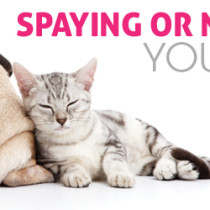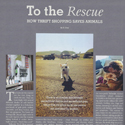Local Spay and Neuter Clinic
SAN MIGUEL VET CLINIC ALONG WITH MONTROSE ANIMAL PROTECTION AGENCY AND TELLURIDE ANIMAL FOUNDATION IS OFFERING A SPAY/NEUTER CLINIC IN NORWOOD MARCH 16-20. SPACE IS LIMITED SO PLEASE CONTACT SAN MIGUEL VETERINARY CLINIC AT 970-327-4279 FOR MORE INFORMATION AND AN APPLICATION, OR RESPOND TO THIS EMAIL.
SOME RESTRICTIONS APPLY. PAYMENT IS DUE AT TIME OF APPLICATION AND IS NON-REFUNDABLE.
COMPREHENSIVE EXAMS, VACCINATIONS, HEARTWORM TESTING ALONG WITH OTHER SERVICES ARE RECOMMENDED FOR YOUR PETS HEALTH AND WILL ALSO BE OFFERED.
Spaying or neutering your pet early in life offers many advantages:
- Prevents unwanted pregnancies and limits pet over-population
- Eliminates the possibility of infections and tumors of the reproductive tract
- Diminishes chances of developing mammary cancer (females)
- Diminishes chances of developing prostatic disease (male dogs)
- Avoids unwanted roaming and aggressive behaviors
Spay: (also called ovariohysterectomy) surgical removal of the ovaries and uterus. While a spay surgery is commonly performed, it is important to remember that the procedure is a major abdominal surgery.
Neuter: (also called castration) surgical removal of the testicles.
Both of these procedures require general anesthesia. Your pet will be monitored closely throughout the entire procedure by our well-trained staff to ensure your pet’s safety.
When your pet goes home:
- You will need to monitor the incision to ensure normal healing. Before your pet leaves the clinic, we will show you what the incision looks like. The incision should stay clean and dry.
- Do not allow your pet to lick or chew the incision.
- Your recovering pet needs to be rested – no running or jumping until the incision has completely healed. Overactivity can lead to complications such as bleeding and infection.
- Limit food and water intake according to take-home instructions.
- Administer pain relief medications according to directions.
Call the clinic if:
- The incision opens, becomes swollen or develops a dischar
- Your pet has any vomiting, diarrhea or lack of an appetite
- Your pet develops a cough
Your friends at,
San Miguel Veterinary Clinic








Visit us!